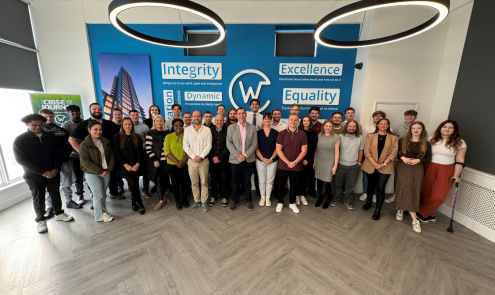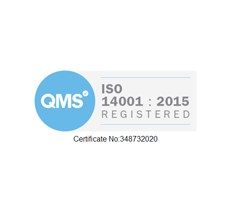2022 – A YEAR OF SIGNIFICANT CHANGE FOR CONSTRUCTION
13 Jan 2023
Alex Hill, Managing Director of Whitecode, discusses the biggest changes to housebuilding in 2022, and what this means going forward.
There were several great changes to the construction industry in the past year which will affect the way we build and manage homes going forward, stemming from a wider cultural overhaul. The global sustainability movement has grown, leading to much-needed conversations in the construction industry. Construction is responsible for approximately 11% of carbon emissions globally, leading the sector to rethink its approach. Alex Hill, Managing Director of Whitecode, discusses the biggest changes to housebuilding in 2022, and what this means going forward.
The government introduced updates to the Building Regulations, which came into effect in June 2022 providing intermediate uplift to existing energy efficiency standards and is a stepping stone towards the government’s new Future Homes Standard (due to be introduced in 2025) which aims to future proof new buildings with low-carbon heating systems and high fabric efficiency standards. The updated Building Regulations, nicknamed ‘FLOS’, concern ventilation, energy consumption, overheating, electric vehicle changing. These updates highlighted several areas of concern for the industry, which are now becoming increasingly important.
Overheating
The updated regulations are part of a significant cultural shift. One of the biggest changes we experienced in the last six months was Approved Document O which provides guidance surrounding change to overheating in homes. As many as 4.6 million homes overheat every year in England alone, according to a recent survey by Loughborough University. Previously, the conversation around overheating has typically been limited to London, but in the past six months we have seen more and more sites talking about overheating.
There’s certainly a lot more dialogue between clients and engineers early on in the process to try to eliminate the problem at its source. Designing proper ventilation in homes is ideal for removing unwanted heat and maintaining a comfortable temperature in the summer months.
For homes which face noise issues, mechanical ventilation systems may be a necessity. One of solutions to reduce the carbon footprint of mechanical cooling is a system we have used where the cooling system feeds back into the heating circuit. Therefore, the energy used during the cooling process will be recovered and used to heat water. Therefore, employing interdependent systems will help to reduce carbon emissions.
Heat pumps
Additionally, Approved Document L which provides guidance around energy consumption has made the conversation around heat pumps ever more relevant – and uptake of heat pumps is already fast-growing. Although innovative solutions towards heating homes are worthwhile, there may be simpler steps that homeowners can take before installing heat pumps. While heat pumps are a very energy efficient technology, they are cost-intensive products. Instead, exploring fabric-first solutions to homes could be the answer, as it deals with the problem at its source.
The shift towards electrification
Another significant change we saw was the update of Approved Document S, outlining guidelines for electric vehicle charging. This is a commendable change, as it signifies the government’s positive attitude towards sustainability. However, as the industry started to adhere to these guidelines, many have found that it is not the installation of EV chargers that is the challenge, but the lack of power. This forms part of the wider shift towards electrification, but currently, we do not have the infrastructure to support it. In 2023, ensuring that we have enough power to support a site’s electrical load will be essential.
In 2022, the market has struggled to cope with the shift towards electrification and many areas are in a power deficit, such as West London. The market has not reacted fast enough to this change. In 2023, the solution will be delivering more heat pumps to help meet the demand for energy efficient resources.
The issue with electrification
The sustainability in construction discourse expanded to sites that don’t need to run using natural gas. However, the potential widespread adoption of full electrification presents an issue for homeowners. If in the future, sustainable methods for harvesting hydrogen on a large scale, or other synthetic natural gases are developed those with electric sites would not be able to take advantage of this change in networks. Therefore, site owners should be cautious of adopting fully electric technologies, as they may miss out on an opportunity if alternative solutions are developed which they might benefit from; particularly when electricity is three times more costly than gas.
The future of building design
Building design has now changed permanently as a result of the Updated Building Regulations. These positive changes mean that building design will continue to evolve, as we find solutions to the new requirements. However, there are often problems with buildings that go unrecognised, such as inefficient façades. In 2023, I think that asset owners will need to begin planning as soon as possible to solve issues with their buildings to help conserve energy and costs. Additionally, homeowners will benefit from taking a wider perspective of the building by considering its fabric, rather than thinking about which technologies can be applied.

Whitecode Consulting Shortlisted for CIBSE...
As a company that prides itself on delivering outstanding sustainability and buildability for its clients, Whitecode Consulting is delighted to announce it has been shortlisted for the prestigious CIBSE Building Performance...
Read More
IS THE TRANSITION TO HEAT PUMPS WORTH THE...
As we contend with the global need to reduce carbon emissions and combat climate change, the UK government is introducing bold initiatives to transition away from fossil fuels. One such initiative is the ban on new gas boilers,...
Read MoreLike to Know More? Let's Talk...







